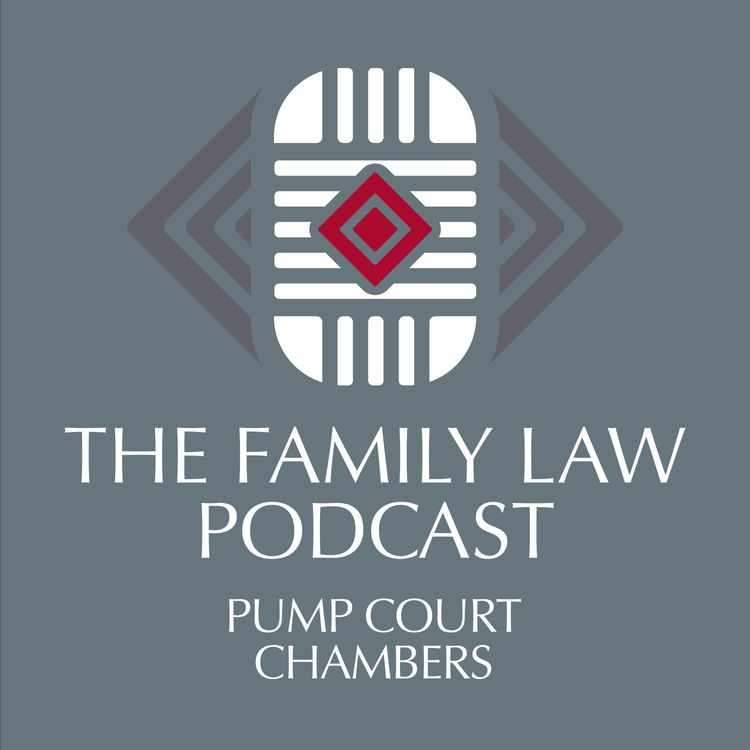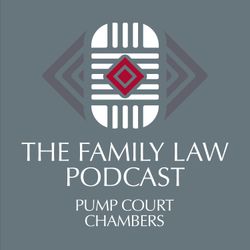Share

The Family Law Podcast
The Law Commission's Review on Financial Remedies
Join Jennifer Lee of Pump Court and star guest, Professor David Hodson OBE, KC (Hons) MCIArb, joint co-founder and senior partner at The International Family Law Group, for a thought-provoking podcast on the Law Commission's review of the laws which determine financial provision on divorce or the ending of a civil partnership.
The Matrimonial Causes Act 1973 Act is now 50 years old. Are there problems with the current framework which require reform? What might the options be?
This podcast will look at the scope of the Law Commission's work on this topic, and delve into the reasons why some have called for a review, the possible options for reform, the pros and cons, and comparisons with other jurisdictions.
Listen to the podcast and let us have your views! Those with questions or comments may contact Jennifer Lee.
More episodes
View all episodes

9. The Family Law Podcast - Privilege against self-incrimination in public children proceedings (Part 2)
37:49||Season 10, Ep. 9The hotly anticipated part 2 of Pump Court Chambers’ Family Law Podcast two part special sees host, Rebekah Batt, discuss the privilege against self-incrimination in public law proceedings with Leslie Samuels KC, with discussion around section 98 warnings, whether conditions or limitations can or will be imposed on disclosure into criminal proceedings and advice to a party facing concurrent public law and criminal proceedings.
8. Privilege against self-incrimination in private children proceedings (Part 1)
33:41||Season 10, Ep. 8In Part 1 of a two part special relating to privilege against self-incrimination, Leslie Samuels KC of Pump Court Chambers joins host Rebekah Batt to discuss the issue in the context of private children proceedings. This includes the extent of any such privilege, disclosure between family and criminal proceedings and guidance for practitioners dealing with the issue.
7. Repeal of Presumption of Parental Involvemnent
38:36||Season 10, Ep. 7In the first episode of the Pump Court Chambers Family Law Podcast for 2026, new host Rebekah Batt is joined by Penny Howe KC, of Pump Court Chambers, and Sarah Williams, of Forsters, to discuss the news that the UK Government intends to repeal the presumption of parental involvement enshrined within the Children Act 1989. They discuss the circumstances surrounding the introduction of the provision, which is now set to be repealed and what impact any repeal may have, in particular, having regard to the different approaches in private and public children proceedings.
6. A teaser for series 10 (part 2) of the Family Law Podcast
01:47||Season 10, Ep. 6A teaser from hosts Maria Henty and Rebekah Batt about what’s coming up in the second half of the current series of the Family Law Podcast in 2026!
5. New Beginnings
35:48||Season 10, Ep. 5In this episode of The Family Law podcast host Maria Henty discusses taking a more holistic approach to divorce and separation, and how different professionals can work with clients in a joined up fashion to support them at a difficult time. Maria is joined for this episode by Emma Wilders-Pratt and Laura Bell of Trethowans and by Elinor Harvey of The Relationship Therapy Practice. Maria and guests discuss the Trethowans New Beginnings initiative and how Emma, Laura, and Elinor work together across their specialisms to help clients. Prospective clients can get in touch with Elinor for availability at hello@relationshiptherapypractice.com
4. Pets on Divorce
36:52||Season 10, Ep. 4In the latest episode of Pump Court's Family Law Podcast, host Maria Henty discusses how the court deals with pets upon divorce and separation, with Estella Newbold-Brown, Partner and Head of Family Law at Amphlett Lissimore.During the episode, Maria and Estella cover the current approach to pets, scope for reform, pet-nups, and Estella’s work with the working group on pets on divorce and separation. A meeting of the All-party Parliamentary Dog Advisory Welfare Group will be held on 9 December 2025 - please click here for further information.
3. The Harman report with Annette Henry KC
30:17||Season 10, Ep. 3In this episode, Maria talks to Annette Henry KC about the Harman Report and also about harassment and bullying at the Bar more generally. Annette is a former criminal Silk and now the founder of Owning Your Wellbeing, Work – a Life Wellbeing Consultant.
2. The Within The Window initiative
33:26||Season 10, Ep. 2In the latest edition of the family law podcast, new host Maria Henty is joined by Antonia Mee of Burgess Mee and Hannah Budd of The Rosefield Divorce consultancy to discuss the Within The Window initiative and how the initiative can be used to help our Family Law clients.“Within The Window” was created by two teams - Burgess Mee and Rosefield Divorce Consultancy - who understand the emotional, practical, financial and legal hurdles you’re facing and the impact that trauma has on what you’re going through.The teams at Burgess Mee and Rosefield Divorce Consultancy have all been trained to integrate a trauma-informed approach to all aspects of their practice of family law.Antonia Mee is the joint founder of the firm and runs it alongside Peter Burgess. Together they have grown the firm, developed its different specialisms and ensured that its strategy remains innovative and forward-thinking. She jointly developed with Peter Burgess the firm’s sister website, The Happy Co-Parent.Hannah Budd practised as a family law solicitor for over 15 years, during which time she represented many hundreds of clients through separation and divorce. Hannah was a partner at a specialist international family law practice and went on to co-found a boutique family law firm. Her work spanned all of the issues that arise from separation, including divorce, the resolution of financial matters and arrangements for children.
1. The Family Law podcast welcomes two new hosts
02:39||Season 10, Ep. 1Pump Court warmly welcomes Maria Henty and Rebekah Batt as our new Family Law podcast hosts. The first new episode will launch this week.